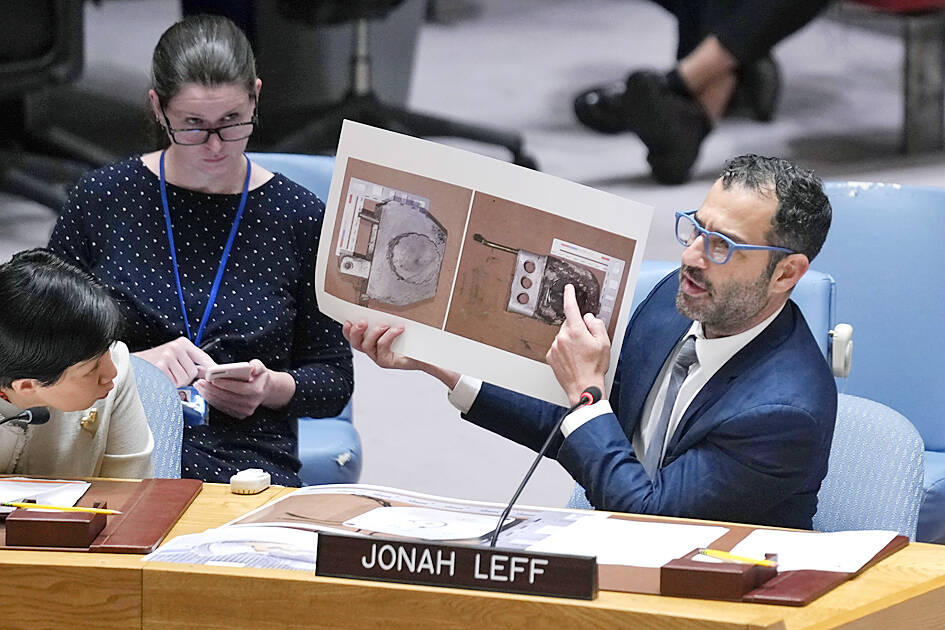The head of a research organization that has been tracing weapons used in attacks in Ukraine since 2018 on Friday told the UN Security Council it has “irrefutably” established that ballistic missile remnants found in Ukraine came from North Korea.
The US and its Western allies clashed with Russia and North Korea at the meeting, saying both countries contravened a UN embargo on arms exports from the Democratic People’s Republic of Korea (DPRK), the country’s official name.
Russia dismissed the “baseless accusations,” and North Korea dismissed the meeting as “an extremely brazen act” to discuss “someone’s alleged ‘weapon transfers.’”

Photo: AP
Jonah Leff, director of operations at Conflict Armament Research, gave the council a detailed analysis of the remnants of the missile that struck Ukraine’s second-largest city, Kharkiv, on Jan. 2.
The organization documented the missile’s rocket motor, its tail section and almost 300 components manufactured by 26 companies from eight countries and territories, and determined the missile was either a KN-23 or KN-24 manufactured last year in North Korea, Leff said.
The organization reached its conclusion based on the missile’s unique characteristics — its diameter, distinct jet vane actuators that direct the missile’s thrust and trajectory, the pattern around the igniter, the presence of Korean characters on some rocket components, and other marks and components dating back to last year, he said.
“Following the initial documentation, our teams inspected three additional identical DPRK missiles that struck Kyiv and Zaporizhzhia earlier this year,” Leff said.
The council discussed illegal arms transfers from North Korea at the request of France, Japan, South Korea, the UK and the US.
The meeting followed Russia’s March 28 veto that ended the monitoring of sanctions against North Korea over its expanding nuclear program by a UN panel of experts. The US and its European and Asian allies accused Moscow of seeking to avoid scrutiny as it allegedly contravenes sanctions to buy weapons from Pyongyang for its war in Ukraine.
US Deputy Ambassador to the UN Robert Wood called Leff’s presentation with its many technical details “quite compelling,” and told the council that while Russia might have ended the panel’s monitoring with China’s “tacit support,” the briefing showed that Moscow and Beijing “cannot prevent the public from learning about the unlawful arms transfers occurring between the DPRK and Russia.”
Russian Ambassador Vassily Nebenzia accused the meeting’s Western sponsors of attempting to use the Security Council “to trot out an anti-Russian and anti-North Korean narrative and to disseminate baseless accusations in order to detract attention from their own destructive actions, which foment escalation in the region.”
Meanwhile, in Moscow, Russian President Vladimir Putin called for resuming production of intermediate-range missiles that were banned under the Intermediate-Range Nuclear Forces Treaty, which the US withdrew from in 2019.
“We need to start production of these strike systems and then, based on the actual situation, make decisions about where — if necessary to ensure our safety — to place them,” Putin said at a meeting of the Russian Security Council.

A Chinese aircraft carrier group entered Japan’s economic waters over the weekend, before exiting to conduct drills involving fighter jets, the Japanese Ministry of Defense said yesterday. The Liaoning aircraft carrier, two missile destroyers and one fast combat supply ship sailed about 300km southwest of Japan’s easternmost island of Minamitori on Saturday, a ministry statement said. It was the first time a Chinese aircraft carrier had entered that part of Japan’s exclusive economic zone (EEZ), a ministry spokesman said. “We think the Chinese military is trying to improve its operational capability and ability to conduct operations in distant areas,” the spokesman said. China’s growing

Taiwan yesterday denied Chinese allegations that its military was behind a cyberattack on a technology company in Guangzhou, after city authorities issued warrants for 20 suspects. The Guangzhou Municipal Public Security Bureau earlier yesterday issued warrants for 20 people it identified as members of the Information, Communications and Electronic Force Command (ICEFCOM). The bureau alleged they were behind a May 20 cyberattack targeting the backend system of a self-service facility at the company. “ICEFCOM, under Taiwan’s ruling Democratic Progressive Party, directed the illegal attack,” the warrant says. The bureau placed a bounty of 10,000 yuan (US$1,392) on each of the 20 people named in

Nine retired generals from Taiwan, Japan and the US have been invited to participate in a tabletop exercise hosted by the Taipei School of Economics and Political Science Foundation tomorrow and Wednesday that simulates a potential Chinese invasion of Taiwan in 2030, the foundation said yesterday. The five retired Taiwanese generals would include retired admiral Lee Hsi-min (李喜明), joined by retired US Navy admiral Michael Mullen and former chief of staff of the Japan Self-Defense Forces general Shigeru Iwasaki, it said. The simulation aims to offer strategic insights into regional security and peace in the Taiwan Strait, it added. Foundation chair Huang Huang-hsiung

PUBLIC WARNING: The two students had been tricked into going to Hong Kong for a ‘high-paying’ job, which sent them to a scam center in Cambodia Police warned the public not to trust job advertisements touting high pay abroad following the return of two college students over the weekend who had been trafficked and forced to work at a cyberscam center in Cambodia. The two victims, surnamed Lee (李), 18, and Lin (林), 19, were interviewed by police after landing in Taiwan on Saturday. Taichung’s Chingshui Police Precinct said in a statement yesterday that the two students are good friends, and Lin had suspended her studies after seeing the ad promising good pay to work in Hong Kong. Lee’s grandfather on Thursday reported to police that Lee had sent